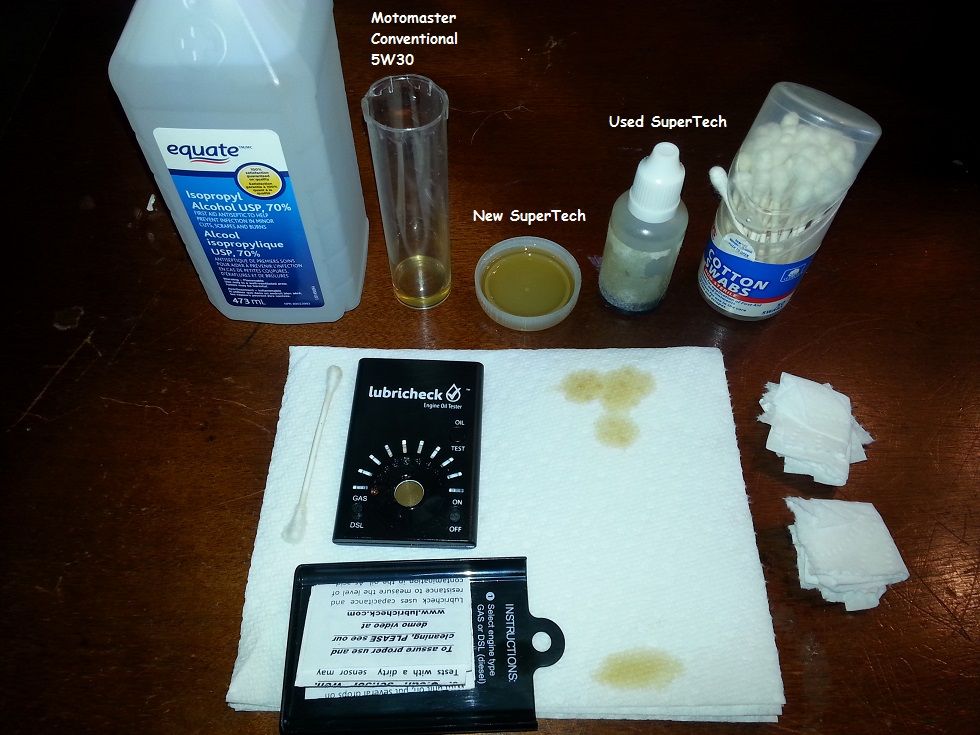I know this is a very old thread, but I just got a Lubricheck so thought I'd post. I've also read a number of posts here and about everything else I can find on the internet.
I created an excel spreadsheet to record my data. I extracted about 2 cc of used SuperTech Full Synthetic 5W30 from my van (2011 Kia Sedona 3.5L V6, 158000 km) with thin tubing marked with tape at the same length as my dipstick and used a small clean squeeze bottle to store and dispense the oil. The oil has 5150 km on it, so I suspected that there was likely a great deal of life left in it.
I did 10 consecutive tests on the oil, making sure the oil and Lubricheck were the same temperature. The data points were:
5, 5, 5, 4, 5, 3, 5, 4, 4, 4 for an average of 4.4. on the 1 - 10 LED scale. 1 -7 represent "excellent" to "good", 8 - 9 "fair" and 10 "change or "check engine". I was hoping for more consistency.
So, in my quest for more consistency, I decided to clean the sensor more thoroughly. My new procedure is to blot up the oil with a microfiber cloth, then spin soft toilet tissue around in the sensor, pressing firmly down. I then use 70% isopropyl alcohol on a Q-Tip, wiping it around, careful to get all into the sensor's edge around the circumference. Then I dry again with toilet tissue. I repeat the alcohol and TP cleaning two more times. I let it sit for a few minutes to be sure the alcohol is evaporated. I turn on the device so it self "calibrates", put 6 drops of oil in - to the fill line, give the oil a gentle stir.
With this new cleaning process, I repeated the test 4 times in a row and got a reading of "3" for all tests. I then cleaned it and preformed the test on a new sample of the SuperTech full Synthetic 5W30 and got 3 consecutive readings of 1. I then repeated the test 4 times on the used oil and got a reading of 3 for all tests.
Although I cannot say for certain that a degree of luck did not result in completely consistent readings, I now know how important it is to have the sensor absolutely spotless.
Based upon my readings of 3, I plan to extend my drain and recheck ~ every 1000 km to see what the Lubricheck has to say. I usually do about an 8000 km OCI. I happen to have a case of 12 filters I bought on Ebay for $50.00 and about 24 L of Castrol GTX I got on clearance at Costco Canada for $2.65 (CAD)/liter, one 5 qt jug of SuperTech Full Syn 5W20, one 5 qt jug SuoerTech Full Syn 5W30 and 1 L of Pennzoil Ultra 0W40 in my stash. Considering this, I'll likely run my oil out to about a 6 - 7 on the Lubricheck scale before doing a change. With all that oil around, I'll be itching to change probably around the 8000 km mark, but I will consider what the Lubricheck has to say. I'd didn't buy it necessarily with extended OCIs in mind, but more to get a sense of the condition of the oil.
The Motomaster oil I just used as another control. It also obtained a reading of "1" as an unused oil.

